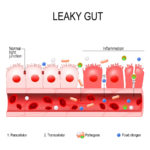By David Blyweiss, M.D., Advanced Natural Wellness
January 8, 2020
Medical errors can be scary…
A few years ago, I was in the ER with my friend because he was having a week of increasing lower abdominal pain and constipation. It was below his belly button and a little bit to the left. With his family history and after a quick exam, I was confident I knew his problem.
This was a clear case of diverticulosis — a dangerous condition where marble-sized pouches in the colon collect stool, bacteria, and undigested food particles.
So, I sat with my friend for five long hours waiting for the ER doctors to do their job.
A CAT scan came back with one single small calcified gall stone. Then – just as I suspected — the scan showed significant signs of diverticulosis with a massive amount of stool backed up in his bowels.
I said to one doctor, “Oh, so this is…”
She cut me off. “Yeah, he’s got gall bladder disease.”
“Well, wait a minute,” I go. “His complaints are not for that location, there’s no referred pain going through his back or up through his right shoulder. There’s no nausea or vomiting. And it’s not associated with any foods he eats.”
Then, I continued, “But he does have significant signs and a family history of diverticulitis. He needs antibiotics!”
She wasn’t going to be convinced. “No, it’s gall bladder disease.”
I gave her another chance. “Did you ask the other doctor if she wants to place him on some antibiotics because his diverticulosis is significant on the CAT scan?”
Open your arteries, improve blood flow for a new health miracle...
Did you know your circulatory system has over 60,000 miles of arteries, veins and other blood vessels, if stretched end to end?
But as you age, your blood vessels undergo changes, which may cause them to stiffen, thicken and get clogged.
GOOD NEWS! Doctors have now identified a “Miracle Molecule” inside your arteries that helps OPEN your arteries and IMPROVE blood flow.
It’s what Dr. Valentin Fuster calls it, "One of the most important discoveries in the history of cardiovascular medicine."To you, that means...
- Healthy blood pressure
- Sharper mind and memory
- Skyrocketing energy and muscular strength
- Increased pleasure and passion in the bedroom
- Improved circulation to every cell and organ in your body
Go here to discover a new natural way to significantly boost the levels of this miracle molecule in YOUR body NOW!
“No,” she responded. “He’s fine to go.”
My friend walked out the hospital doors with a few thousand dollars in bills, a wrong diagnosis, and pain that was worsening by the hour.
That’s a medical error.
Now, diverticulitis can be a dangerous condition. So, I took action when my friend’s pain continued to worsen over the next day. I called in the antibiotics prescription and talked to him about adjusting his diet to include more soluble fibers….prunes, apples, metamucil and water.
He felt completely better within 48 hours.
Why am I sharing this story? Well, I want you to understand the risks you may be facing if you find yourself in a hospital.
We’re finding the third leading cause of death in the U.S. may be due to undocumented medical errors. However, you’ll never hear about this from the Centers for Disease Control and Prevention (CDC).
That’s because “medical error” is not included on a death certificate. There is no official “classification” for it under the current coding system. Instead, whatever disease or injury first brought you to the hospital is what goes down on the death certificate.
As a result, medical error never shows up on rankings that identify today’s major causes of death.
As if that’s not bad enough, hospitals are a great place to pick up mutated bacteria species. You may go for one condition and end up contracting a hospital related infections from MRSA, sepsis or c. difficile (bacteria-related diarrhea).
Now, if you take medical errors and infection out of the equation, the top five causes of death are well defined…
- Heart disease
- Cancer
- Chronic lower respiratory disease (pneumonias, asthma, emphysema)
- Unintentional accidents
- Strokes
So how can you stay out of the hospital and avoid your risk of hospital-acquired infections and medical mistakes?
Your best bet is to not get sick in the first place!
And you can do that by protecting yourself from these five highly preventable health disasters.
Here’s What You Can You Do to Avoid a Trip to the Hospital
Many diseases are directly linked to the choices you make in life… choosing to exercise vs being lazy or choosing healthy foods vs giving into cravings for fat, sugar, and salt.
Are You Suffering From...
- Love handles and a pot belly
- Romance that isn't what it used to
- Forgetfulness and inattention
- Low (or no) strength and endurance
- A sex drive that's shifted into neutral...or worse
If so...you may have Mature Male Burnout. Click here to discover more about this unique condition and what you can do about it.
So let’s take a look at some important choices you can make in your life to improve your health and keep you out of the hospital.
- Stay active.
An active life full of daily movement will do a world of good for your overall health. It will give a boost to your heart, help shield you from cancer, slash your chances of a stroke and increase your lung capacity.
In other words, daily movement can protect you from four of the five leading causes of death! These means it can also help keep you out of the hospital.
- Eat well.
When it comes to your health, what you put into your body plays a defining role. Sugars and processed meats are particularly bad for you.
First off, they disrupt your cardiovascular system, which contributes to heart disease and stroke.
Secondly, these foods are directly linked with your risk of cancer. In fact, just last year the World Health Organization classified processed meat as carcinogenic to humans.
However, eating an antioxidant-rich rainbow-colored diet is actually protective against these risks. In fact, enjoying a Mediterranean diet high in extra virgin olive oil could shrink your chances of a heart attack, a stroke and death from cardiovascular problems by up to 30%.
Eating this way is also protective against breast cancer, can help you lose weight and reduce metabolic disorders that add to the risk of other diseases.
It’s not difficult to go Mediterranean. Just load your plate with organic antioxidant-rich fruits, vegetables, herbs and spices. Tree nuts, omega-3 rich wild-caught seafood and olive oil are also important elements of this type of diet.
Keep animal protein to only about 13% of your diet. And when you choose to eat red meat, opt for grass-fed over grain-fed. It’s much healthier for you.
- Ditch addiction.
When you consider the health consequences of an inactive lifestyle and poor diet, you could say these factors are actually the two leading causes of death today.
After that, I’d have to place addiction as the third item on the list.
Smoking, of course, is the leading cause of respiratory problems and lung cancer deaths today. While quitting is hard, methods like acupuncture and hypnosis can help you get through the worst of it.
Heavy alcohol use is another big contributor to disease. It’s a leading risk factor when it comes to death and disability.
And it’s not only the liver you have to worry about. It’s also associated with certain cancers and heart disease. Additionally, too much alcohol greatly increases your chance of injuring yourself due to an unintentional accident.
The most alarming addiction these days, however, is prescription opiates. At last count, somewhere around 2 million people here in the U.S. were abusing or addicted to these drugs.
They can easily land you in the hospital due to an overdose or injury. Opiates also tend to decrease your immune system and lower testosterone especially in men.
As a matter of fact, opiate addictions make up a large percentage of deaths from unintentional injury.
If you’re on opiates, the best thing you can do is work with your doctor to ease off of them and find safer alternatives to pain relief.
Before closing, I would like to add most medical errors aren’t caused by “bad” doctors or other medical personnel. Rather, the entire insurance and disease management systems are riddled with barriers to care these days. Time that should be directed towards taking a comprehensive history and physical exam is spent on the electronic medical record system, checking boxes and filling in templates that are put in place to help insurers get control of payments not guarantee an improved physician patient relationship or improved patient outcomes.
For example, let’s say your doctor chooses specific diagnostics or treatments for you. These are often hampered by protocols. Time is wasted on pre-authorizations.
Sometimes they’re ruled as not medically necessary. Other times, they’re coded wrong, not covered, or flat-out denied. This often results in second or third choice testing and treatment that can have a direct impact on you.
So it’s worth adopting strategies to help keep you out of the hospital and living a longer and healthier life for good!
SOURCES:
Makery MA, et al. Medical error—the third leading cause of death in the US. BMJ. 2016;353:i2139.
Onodera Y, et al. Increased sugar uptake promotes oncogenesis via EPAC/RAP1 and O-GlcNAc pathways. J Clin Invest. 2014 Jan 2; 124(1): 367–384.
Yang Q, et al. Added sugar intake and cardiovascular diseases mortality among US adults. JAMA Intern Med. 2014 Apr;174(4):516-24.
IARC Monographs evaluate consumption of red meat and processed meat. Press Release. World Health Organization. Oct 2015.
Kaluza J, et al. Processed and unprocessed red meat consumption and risk of heart failure: prospective study of men. Circ Heart Fail. 2014 Jul;7(4):552-7.
Estruch R, et al. Primary prevention of cardiovascular disease with a Mediterranean diet. N Engl J Med. 2013 Apr 4;368(14):1279-90.
Toledo E, et al. Mediterranean Diet and Invasive Breast Cancer Risk Among Women at High Cardiovascular Risk in the PREDIMED Trial: A Randomized Clinical Trial. JAMA Intern Med. 2015 Nov;175(11):1752-60.
Holmes MV, et al. Association between alcohol and cardiovascular disease: Mendelian randomisation analysis based on individual participant data. BMJ. 2014 Jul 10;349:g4164.
Substance Abuse and Mental Health Services Administration, National Survey on Drug Use and Health, 2014.







